Abstract
Gastric acid secretion, pepsin secretion, and fasting serum gastrin levels were measured in 23 patients with duodenal ulcer disease, divided into three groups which received either cimetidine 800 mg daily, cimetidine 1600 mg daily, or ranitidine hydrochloride 300 mg daily for eight weeks. Pentagastrin tests were carried out at intervals both before and after treatment. Each dose of cimetidine reduced acid secretion to 42% of control one week after starting therapy. Ranitidine reduced acid secretion to 33% of the pretreatment value. Acid secretion remained suppressed to these levels throughout treatment with each drug. Acid secretion returned to pretreatment levels in all patients one week after treatment and remained normal until the end of the study. Both drugs reduced pepsin, which fell to 64% and 61% (p less than 0.01) after 800 mg and 1600 mg cimetidine respectively and to 65% (p less than 0.005) with ranitidine after one week's treatment. Pepsin secretion remained at this reduced level in both cimetidine groups till the end of treatment. Pepsin levels fell to 50% at two weeks of therapy with ranitidine but stabilised at this level till the end of therapy. Cimetidine withdrawal was followed by a return towards pretreatment levels of pepsin secretion; but secretion remained significantly depressed (p less than 0.05) to the end of the study period. In the ranitidine-treated patients pepsin output returned to normal after drug withdrawal. Fasting gastrin levels rose during treatment with both drugs but failed to reach significant levels. After withdrawal of treatment fasting serum gastrin levels returned to normal in all three groups of patients.
Full text
PDF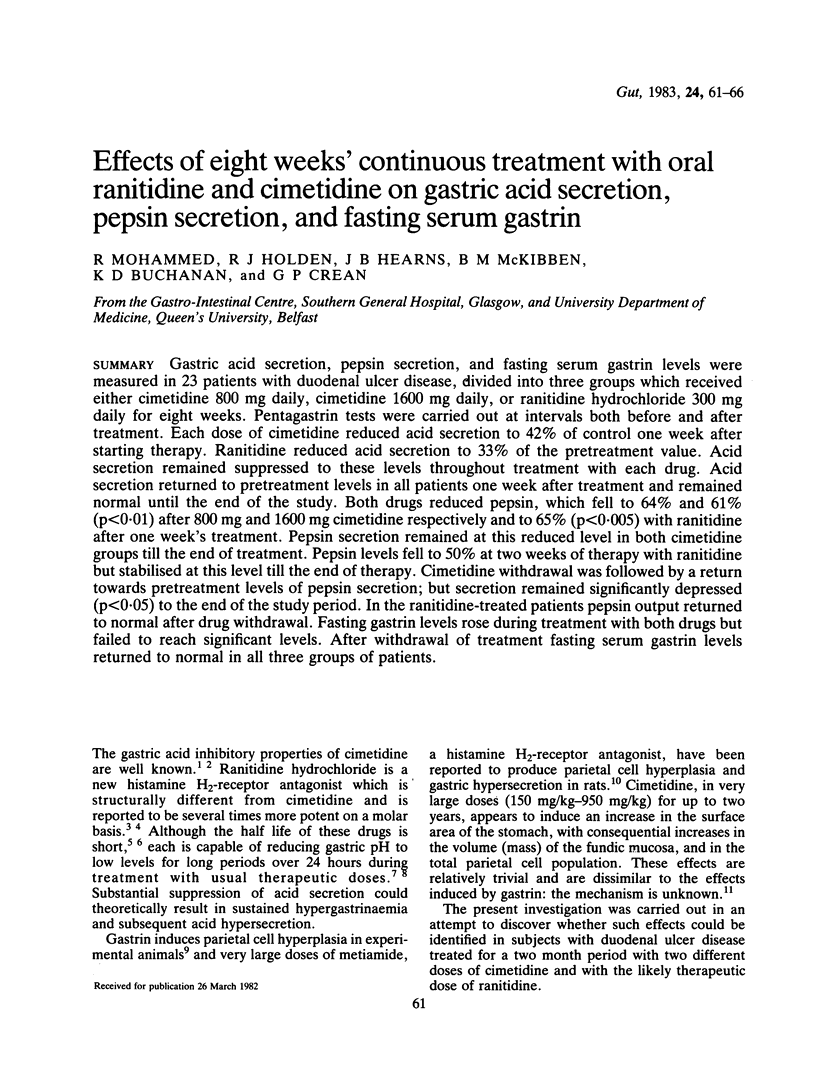
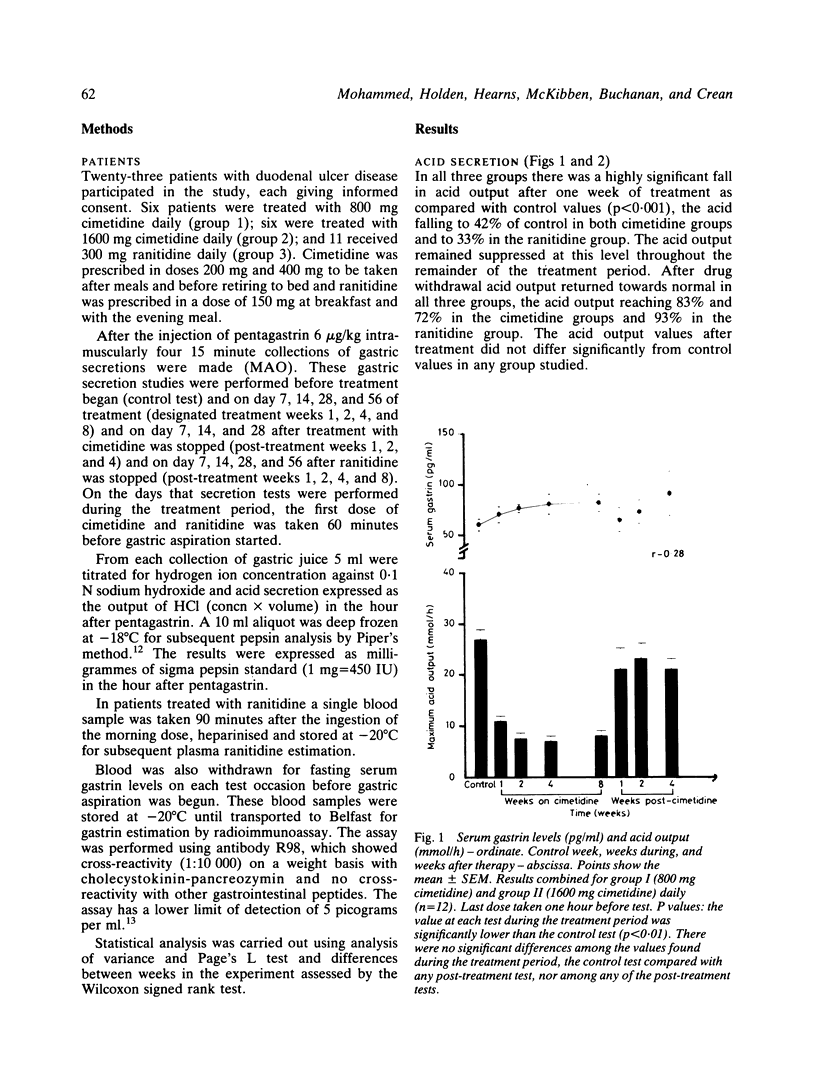
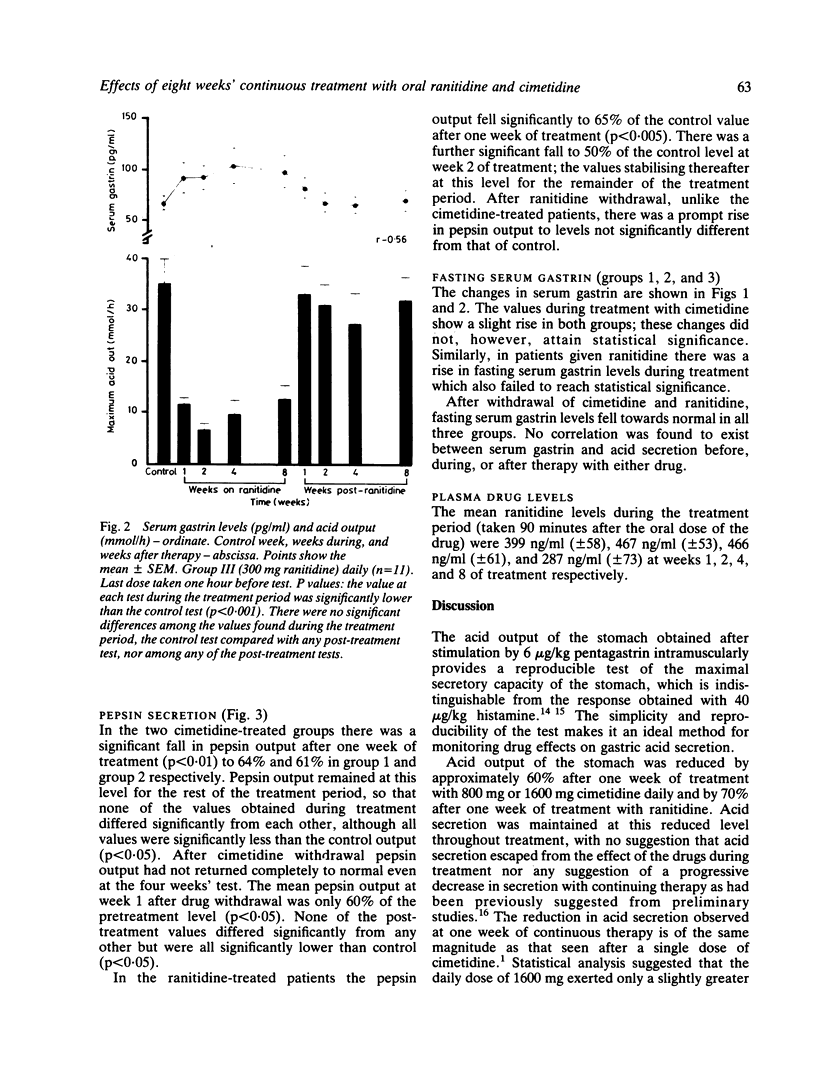
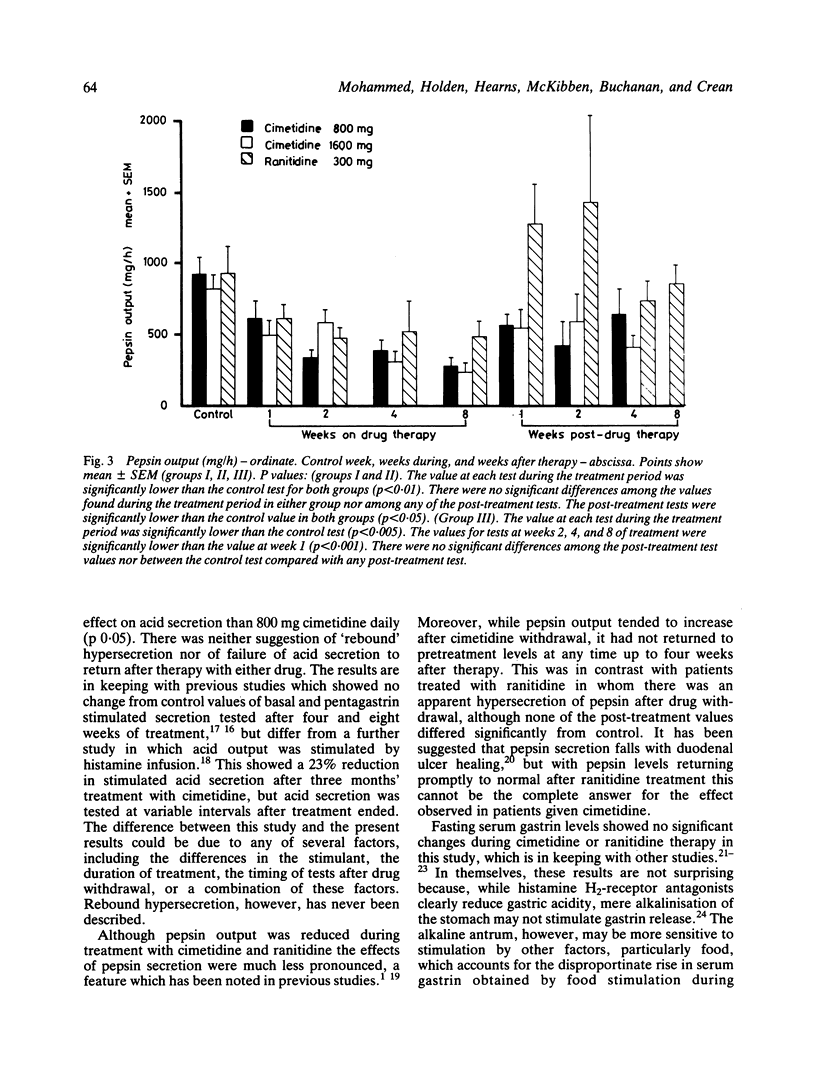
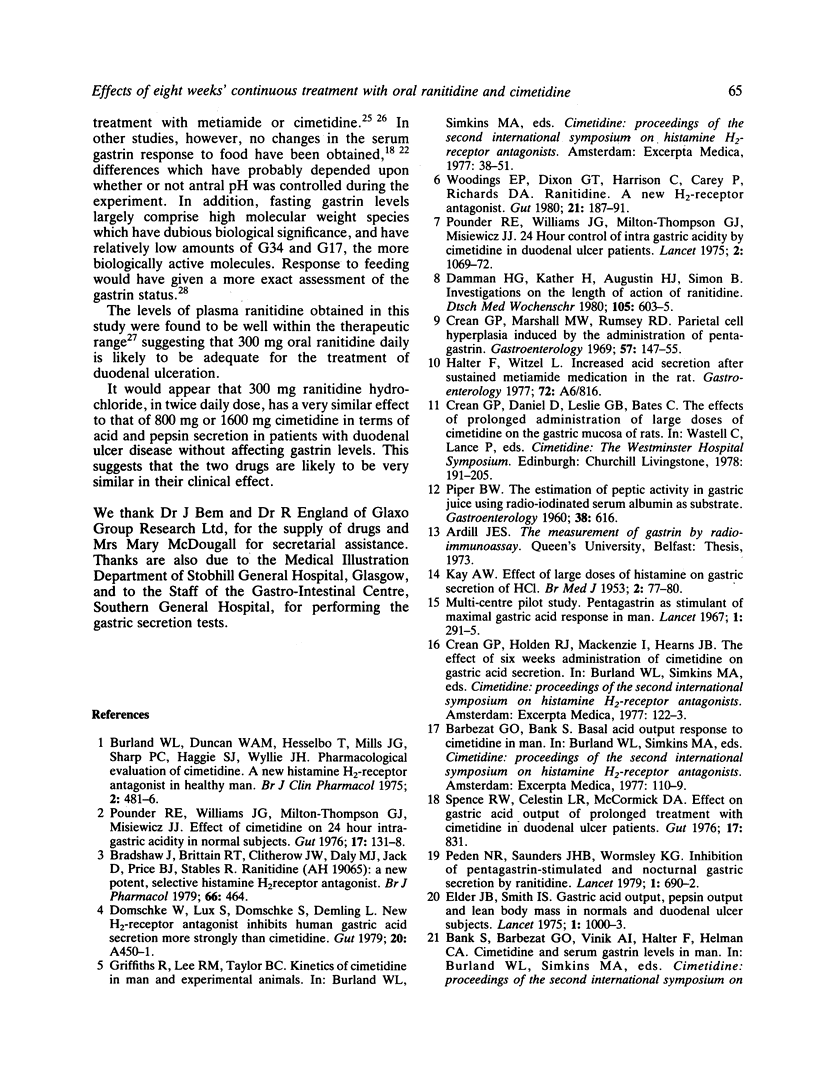
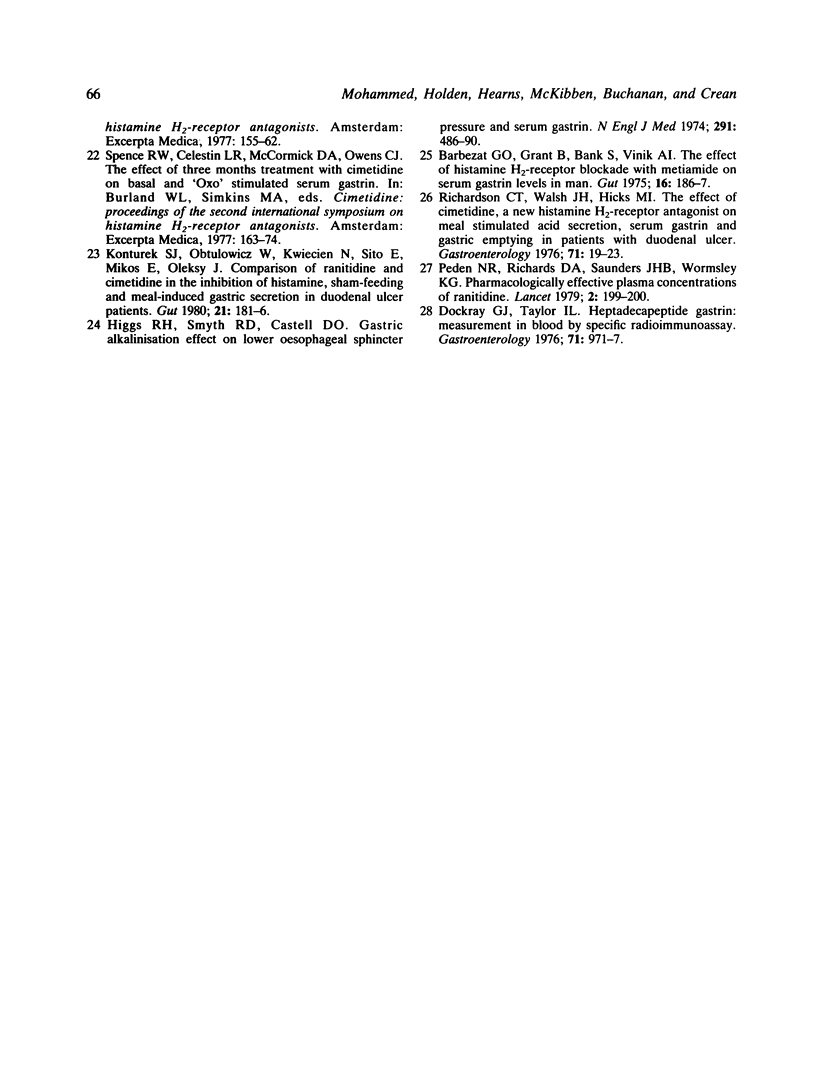
Selected References
These references are in PubMed. This may not be the complete list of references from this article.
- Barbezat G. O., Grant B., Bank S., Vinik A. The effect of histamine H2-receptor blockade with metiamide on serum gastrin levels in man. Gut. 1975 Mar;16(3):186–187. doi: 10.1136/gut.16.3.186. [DOI] [PMC free article] [PubMed] [Google Scholar]
- Burland W. L., Duncan W. A., Hesselbo T., Mills J. G., Sharpe P. C., Haggie S. J., Wyllie J. H. Pharmacological evaluation of cimetidine, a new histamine H2-receptor antagonist, in healthy man. Br J Clin Pharmacol. 1975 Dec;2(6):481–486. doi: 10.1111/j.1365-2125.1975.tb00564.x. [DOI] [PMC free article] [PubMed] [Google Scholar]
- Crean G. P., Marshall M. W., Rumsey R. D. Parietal cell hyperplasia induced by the administration of pentagastrin (ICI 50,123) to rats. Gastroenterology. 1969 Aug;57(2):147–155. [PubMed] [Google Scholar]
- Dammann H. G., Kather H., Augustin H. J., Simon B. Untersuchung über die Wirkungsdauer von Ranitidin. Dtsch Med Wochenschr. 1980 Apr 25;105(17):603–605. doi: 10.1055/s-2008-1070714. [DOI] [PubMed] [Google Scholar]
- Dockray G. J., Taylor I. L. Heptadecapeptide gastrin: measurement in blood by specific radioimmunoassay. Gastroenterology. 1976 Dec;71(6):971–977. [PubMed] [Google Scholar]
- Higgs R. H., Smyth R. D., Castell D. O. Gastric alkalinization. Effect on lower-esophageal-sphincter pressure and serum gastrin. N Engl J Med. 1974 Sep 5;291(10):486–490. doi: 10.1056/NEJM197409052911002. [DOI] [PubMed] [Google Scholar]
- KAY A. W. Effect of large doses of histamine on gastric secretion of HCI; an augmented histamine test. Br Med J. 1953 Jul 11;2(4827):77–80. doi: 10.1136/bmj.2.4827.77. [DOI] [PMC free article] [PubMed] [Google Scholar]
- Konturek S. J., Obtulowicz W., Kwiecien N., Sito E., Mikos E., Oleksy J. Comparison of ranitidine and cimetidine in the inhibition of histamine, sham-feeding, and meal-induced gastric secretion in duodenal ulcer patients. Gut. 1980 Mar;21(3):181–186. doi: 10.1136/gut.21.3.181. [DOI] [PMC free article] [PubMed] [Google Scholar]
- PIPER D. W. The estimation of peptic activity in gastric juice using radioiodinated serum albumin as substrate. Gastroenterology. 1960 Apr;38:616–621. [PubMed] [Google Scholar]
- Peden N. R., Richards D. A., Saunders J. H., Wormsley K. G. Pharmacologically effective plasma concentrations of ranitidine. Lancet. 1979 Jul 28;2(8135):199–200. doi: 10.1016/s0140-6736(79)91466-1. [DOI] [PubMed] [Google Scholar]
- Peden N. R., Saunders J. H., Wormsley K. G. Inhibition of pentagastrin-stimulated and nocturnal gastric secretion by ranitidine. A new H2-receptor antagonist. Lancet. 1979 Mar 31;1(8118):690–692. doi: 10.1016/s0140-6736(79)91146-2. [DOI] [PubMed] [Google Scholar]
- Pounder R. E., Williams J. G., Milton-Thompson G. J., Misiewicz J. J. 24-hour control of intragastric acidity by cimetidine in duodenal-ulcer patients. Lancet. 1975 Nov 29;2(7944):1069–1072. doi: 10.1016/s0140-6736(75)90434-1. [DOI] [PubMed] [Google Scholar]
- Richardson C. T., Walsh J. H., Hicks M. I. The effect of cimetidine, a new histamine H2-receptor antagonist, on meal-stimulated acid secretion, serum gastrin, and gastric emptying in patients with duodenal ulcer. Gastroenterology. 1976 Jul;71(1):19–23. [PubMed] [Google Scholar]
- Woodings E. P., Dixon G. T., Harrison C., Carey P., Richards D. A. Ranitidine--a new H2-receptor antagonist. Gut. 1980 Mar;21(3):187–191. doi: 10.1136/gut.21.3.187. [DOI] [PMC free article] [PubMed] [Google Scholar]


